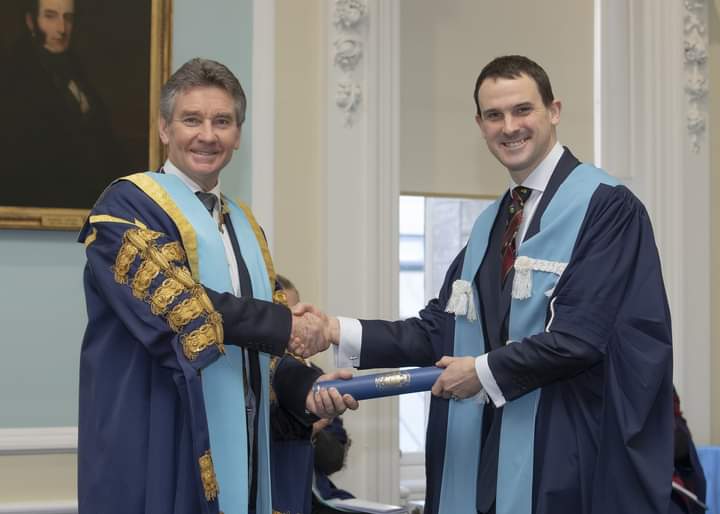A trainee surgeon at Manchester Royal Infirmary (MRI) was recently awarded a prestigious national honour for his contributions to transplant research.
Mr Iestyn Shapey, Specialist Trainee in Hepatobiliary and Pancreatic Surgery, was awarded the Syme medal by the Royal College of Surgeons of Edinburgh (RCSEd). Named after the eminent nineteenth century surgeon James Syme, the award is given to trainee surgeons who have displayed a high-quality body of research which has impacted future research of clinical practice.

Mr Shapey received the award for his research Transplant Unit at the MRI, part of Manchester University NHS Foundation Trust (MFT), into blood sugar (glucose) control in organ donors, and how this affects the success of pancreas transplants and cells responsible for glucose regulation in diabetic patients. He was presented with the medal by Professor Michael Griffin OBE at a ceremony in Edinburgh.
Mr Shapey said: “Findings from my research have been used to make better decisions on which organs to accept for transplantation, and how to manage them during the transplantation process so that they can last longer and stand a better chance of working properly for our patients.”
“It’s a great privilege to receive the Syme Medal and be recognised by peers at the Royal College of Surgeons of Edinburgh. I hope that I will be able to use this award as a platform from which to launch the next stage of my research career.”
In 2016 Mr Shapey also received an MFT Peter Mount Fellowship, which supports promising early career clinical researchers to prepare submissions for other external fellowships or research funding applications. This provided seed funding and support for Iestyn to develop the larger body of research for which he was awarded the Syme medal.
Professor Rick Body, Group Director of Research and Innovation (R&I) at MFT, said: “This is a fantastic honour for Iestyn from the Royal College of Surgeons of Edinburgh in recognition of the important impact of his research, findings from which have directly led to better care and treatment for our transplant and diabetic patients at the MRI.
“We’re incredibly proud to support clinical researchers to develop in their careers. Iestyn’s quality of research is a fantastic example of the huge benefits clinical research can bring about to our participants and populations across Greater Manchester, as well as researchers themselves.”
Findings from Mr Shapey’s research have included:
- The important relationship between insulin therapy and blood sugar control within organ donation and transplantation.
- How use of insulin in critical care, during the donation period predicts the subsequent function of transplanted islets (groups of cells in the pancreas, and in transplanted pancreas.
- How controlling blood sugar early during transplant procedure can predict the survival of the pancreas.
- That poor blood sugar control during organ donation occurs is caused by the death of insulin-producing cells.
- That a new blood test can predict future function of the transplanted organs and guide clinicians’ decisions whether to accept an organ for transplantation.
Mr Shapey’s research will hopefully lead to a randomised trial to see whether insulin therapy for both donors and patients can improve outcomes and reduce complications in pancreas transplants. He also hopes to expand the utility of the blood test to include patients undergoing pancreatic surgery for cancer and pancreatitis.